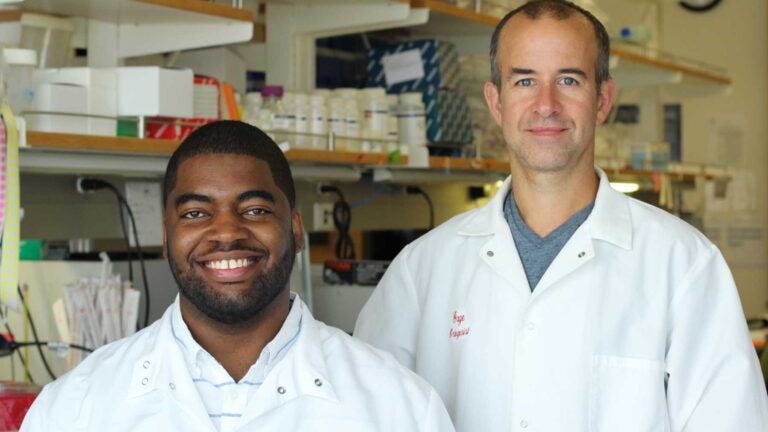
Stem cell scientist defies expectations through sheer determination
Intrigued by medicine as a teen, D’Juan Farmer became the first person in his family to attend college — and now he dreams of running his own lab
D’Juan Farmer grew up in a neighborhood where attending college — let alone pursuing a PhD or postdoctoral training — was not the expectation.
How did he do it?
“Will power,” said Farmer, who is pursuing his postdoctoral training in the USC Stem Cell laboratory of Gage Crump.
Growing up in Compton, Farmer became intrigued by medicine and science after reading the memoir Death Be Not Proud by John Gunther. The book chronicles the life of Gunther’s son, a budding scientist who died of a brain tumor at age 17.
“One of my older brothers got that book for some reason from his school — as in he had to do a report, and he never read it,” Farmer said. “So I read it and I still have it. I had to be in my early teens — maybe 12, 13. And I said, ‘I want to be a doctor or an oncologist.’ ”
Soon afterward, Farmer earned admission into a highly competitive magnet high school: the California Academy of Mathematics and Science on the campus of California State University, Dominguez Hills.
Farmer became the first person in his family to attend college — and set an example followed by his two younger brothers. As a UCLA undergraduate pursuing his bachelor of science in molecular, cell and developmental biology, Farmer discovered his passion for research in a roundabout way.
“I went to UCLA at a time where there were only 100 African-Americans in the class that year, so there was a lot of advocacy and discussion about it,” said Farmer, whose first research experience looked at perceived discrimination or perceived stress and how the body responds to it. “But I discovered that I was more interested in how the biology worked,” he said.
Lab work
Inspired by this curiosity, Farmer joined the laboratory of Luisa Iruela-Arispe, where he studied the role of estrogen signaling in early mouse placental development.
“When I saw Dr. Iruela-Arispe’s work, I fell in love, and I was in the laboratory more than I should have been in terms of balance and everything else,” Farmer said. “So very quickly, I knew I wanted to do a PhD. I didn’t want to do medicine anymore.”
To ensure that he would enjoy even longer hours in the lab, he did a one-year post-baccalaureate fellowship at the National Institutes of Health. In the lab of Lawrence Brody, Farmer studied genetic variations that affect the metabolism of Vitamin B12 and resulting birth defects in the heart and brain.
“I loved it there,” he said. “That was a really strong indicator that I’d be happy as a graduate student, and I was.”
As a PhD candidate in biochemistry and molecular biology, he joined the lab of Michael McManus at the University of California, San Francisco. Farmer studied the role of molecules called microRNAs in the development of the lacrimal glands that produce tears and lubricate the eyes. Without lacrimal glands, an animal’s vision can be drastically impaired.
A fine fellow
Farmer has earned the inaugural Choi Family Postdoctoral Fellowship, which provides support to recruit exceptional postdoctoral fellows to USC Stem Cell labs.
In his new position, Farmer is looking forward to shifting his focus to craniofacial and skeletal development in the Crump Laboratory at USC. He will contribute to the effort to understand a serious birth defect known as craniosynostosis, which can constrict and damage the developing brain due to the premature fusion of joints in the skull called sutures.
What I’m really interested in is how early defects in cellular identity and behavior lead to late onset defects.
D’Juan Farmer
“What I’m really interested in is how early defects in cellular identity and behavior lead to late onset defects,” Farmer said. “What early changes lead to the premature fusion of sutures and can these cells be recovered? People often assume that if you correct the mutated gene, it’s going to correct the defect. Yet in some processes, it might be too late, and intervention might need to be really early.”
Farmer is grateful to the Choi Family for its support of this important research and of his scientific training. Looking ahead, he aspires to become an investigator running his own lab at a university.
“It’s definitely the dream,” he said. “And being involved in both minority and first-generation activities is, in part, why I really like the idea of being in the academic setting. It’s great to be a mentor and improve the education system while doing science.”



